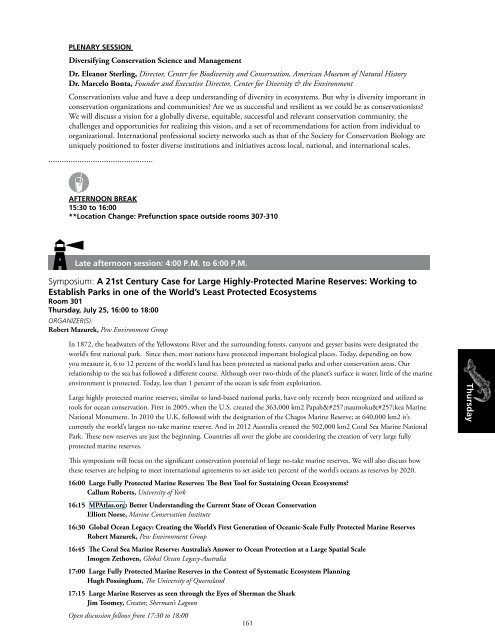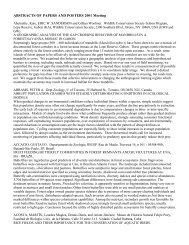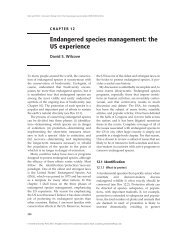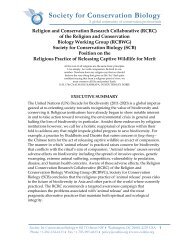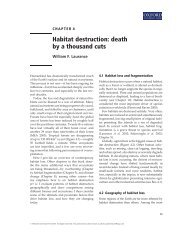ICCB 2013 Program - Society for Conservation Biology
ICCB 2013 Program - Society for Conservation Biology
ICCB 2013 Program - Society for Conservation Biology
Create successful ePaper yourself
Turn your PDF publications into a flip-book with our unique Google optimized e-Paper software.
Plenary Session<br />
Diversifying <strong>Conservation</strong> Science and Management<br />
Dr. Eleanor Sterling, Director, Center <strong>for</strong> Biodiversity and <strong>Conservation</strong>, American Museum of Natural History<br />
Dr. Marcelo Bonta, Founder and Executive Director, Center <strong>for</strong> Diversity & the Environment<br />
<strong>Conservation</strong>ists value and have a deep understanding of diversity in ecosystems. But why is diversity important in<br />
conservation organizations and communities Are we as successful and resilient as we could be as conservationists<br />
We will discuss a vision <strong>for</strong> a globally diverse, equitable, successful and relevant conservation community, the<br />
challenges and opportunities <strong>for</strong> realizing this vision, and a set of recommendations <strong>for</strong> action from individual to<br />
organizational. International professional society networks such as that of the <strong>Society</strong> <strong>for</strong> <strong>Conservation</strong> <strong>Biology</strong> are<br />
uniquely positioned to foster diverse institutions and initiatives across local, national, and international scales.<br />
...............................................<br />
Afternoon Break<br />
15:30 to 16:00<br />
**Location Change: Prefunction space outside rooms 307-310<br />
late afternoon session: 4:00 p.m. to 6:00 p.m.<br />
Symposium: A 21st Century Case <strong>for</strong> Large Highly-Protected Marine Reserves: Working to<br />
Establish Parks in one of the World’s Least Protected Ecosystems<br />
Room 301<br />
Thursday, July 25, 16:00 to 18:00<br />
Organizer(s):<br />
Robert Mazurek, Pew Environment Group<br />
In 1872, the headwaters of the Yellowstone River and the surrounding <strong>for</strong>ests, canyons and geyser basins were designated the<br />
world’s first national park. Since then, most nations have protected important biological places. Today, depending on how<br />
you measure it, 6 to 12 percent of the world’s land has been protected as national parks and other conservation areas. Our<br />
relationship to the sea has followed a different course. Although over two-thirds of the planet’s surface is water, little of the marine<br />
environment is protected. Today, less than 1 percent of the ocean is safe from exploitation.<br />
Large highly protected marine reserves, similar to land-based national parks, have only recently been recognized and utilized as<br />
tools <strong>for</strong> ocean conservation. First in 2005, when the U.S. created the 363,000 km2 Papahānaumokuākea Marine<br />
National Monument. In 2010 the U.K. followed with the designation of the Chagos Marine Reserve; at 640,000 km2 it’s<br />
currently the world’s largest no-take marine reserve. And in 2012 Australia created the 502,000 km2 Coral Sea Marine National<br />
Park. These new reserves are just the beginning. Countries all over the globe are considering the creation of very large fully<br />
protected marine reserves.<br />
Thursday<br />
This symposium will focus on the significant conservation potential of large no-take marine reserves. We will also discuss how<br />
these reserves are helping to meet international agreements to set aside ten percent of the world’s oceans as reserves by 2020.<br />
16:00 Large Fully Protected Marine Reserves: The Best Tool <strong>for</strong> Sustaining Ocean Ecosystems<br />
Callum Roberts, University of York<br />
16:15 MPAtlas.org: Better Understanding the Current State of Ocean <strong>Conservation</strong><br />
Elliott Norse, Marine <strong>Conservation</strong> Institute<br />
16:30 Global Ocean Legacy: Creating the World’s First Generation of Oceanic-Scale Fully Protected Marine Reserves<br />
Robert Mazurek, Pew Environment Group<br />
16:45 The Coral Sea Marine Reserve: Australia’s Answer to Ocean Protection at a Large Spatial Scale<br />
Imogen Zethoven, Global Ocean Legacy-Australia<br />
17:00 Large Fully Protected Marine Reserves in the Context of Systematic Ecosystem Planning<br />
Hugh Possingham, The University of Queensland<br />
17:15 Large Marine Reserves as seen through the Eyes of Sherman the Shark<br />
Jim Toomey, Creator, Sherman’s Lagoon<br />
Open discussion follows from 17:30 to 18:00<br />
161


